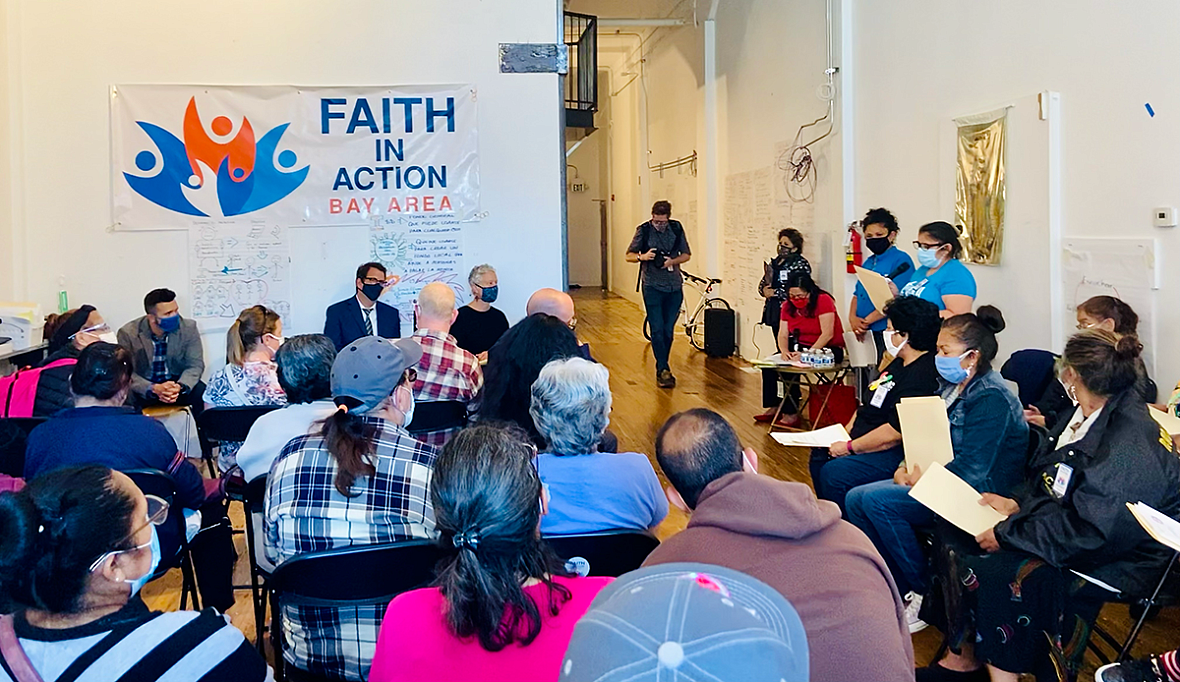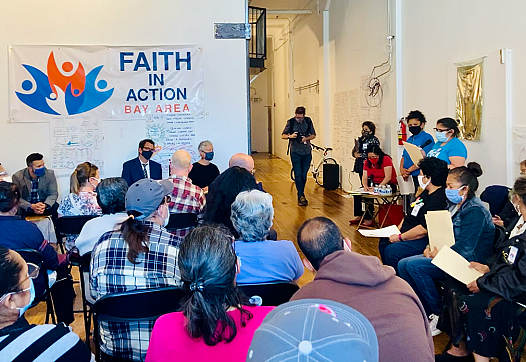Rent relief denied; applicants plan to appeal before July 1 deadline
This story was originally published in Mission Local with support from the 2022 California Fellowship.

Faith in Action community leaders, low-income families and elders, local clergy and congregation members ask Supervisors to fund local rent relief at a meeting on Wednesday in the Mission.
Photo by Clara-Sophia Daly. Taken June 24, 2021.
When a Bayview resident heard the governor say the state would pay rent for tenants who suffered in the pandemic, she figured she was a shoo-in. She lost her business during Covid-19 and missed 23 months of rent. Nonetheless, months later, the state denied her application.
“Why? If I’m behind in rent, if I’m behind in PG&E, if I’m behind in water, because of this pandemic, why didn’t I get help?” said Ms. Ross, who asked that her full name be withheld because of the stigma attached to getting aid. “I gave [the state] all the documentation needed, and they still denied me.”
When Ross asked why, a state employee explained she was unresponsive to an email they sent. But the program sent the notice to the wrong email address, Ross said. She is appealing the decision, which a tenant must do within 30 days.
Ross is one of 144,000 statewide whose applications for rent relief have been declined, according to the state housing department. Overall, some 320,000 households were approved, amounting to $3.7 billion. A study by the National Equity Atlas suggests thousands of San Franciscans, about 29 percent, have been denied.
Sharon Herrera, who runs the Latino Task Force’s rent relief distribution, calls it “a wave of denials.” Almost 20 percent of the 1,037 applications that Mission, Excelsior, and Bayview residents filled out in the Latino Task Force Hub by mid-May were rejected. Most are low-income residents who lost work in the pandemic; in theory, the target population for the program.
The reasons? Of the 144,000 denied, 60 percent were deemed “ineligible.” This could mean a resident who is “not actually a tenant,” someone who earned too much income, or someone who was living in an area that wasn’t a part of the program, according to Nur Kausar, a California housing department spokesperson. Some cities opted out of the state program and offered a local program instead.
The state program requires a written lease agreement to qualify for relief, but many subtenants who applied are subtenants, or don’t have a lease for other reasons, Herrera said.
Another 38 percent of the 144,000 rejected applicants were, like Ross, “unresponsive” when state officials asked follow-up questions or for extra documents, Kausar said in an email.
Herrera said that most of the Task Force’s rejected applications fell into the category of “unresponsive” applicants, but she argued that the follow-up was inadequate for any number of reasons. In Ross’s case, the wrong email was used. Others may have received the email in English, but can only read Spanish or another foreign language.
“It’s really difficult,” Herrera said. “It’s not the tenants’ fault that they were not able to get this assistance.”
Herrera also questioned whether the state ever contacted some of their applicants. The state “says they have attempted to contact the tenant multiple times. We don’t have evidence of that. There are no text messages, or calls, so many are confused and don’t understand why [they] have a denial,” Herrera said.
Kausar noted the program can follow up in multiple languages. However, the program has received discrimination complaints for the failure to address the needs of monolingual immigrants and disabled residents.
Meanwhile, Mission and Bayview residents are facing “a lot” of eviction warnings, community advocates said. So far, it’s unclear how many have escalated to eviction court, though organizers believe it’s few.
Kamillah Ealom, who runs the rent relief program for Mission Neighborhood Centers in the Bayview, estimated that about 10 percent of her applicants had been denied. While many applicants received three-day eviction notices, she said, “people being put on the streets, that’s not happening. We’re in an unexpected grace period.”
State lawmakers declared that any person with a rent relief application that needs review is exempt from eviction until July 1. If an application is rejected and not appealed, there are no protections.
Herrera and Ealom have encouraged tenants to appeal their rejections and apply for local rent relief in the meantime. More than 130 tenants applied for the local program, Ealom said, and 64 have been paid. The local program offers relief for rent owed from April 1, 2022, and beyond, not the months covered by the state rent relief program.
Some organizers, like Saudia Shaw at Young Communities Developers, which works with both state and local rent relief, are confident the state will pay everyone by July 1. “From what I’ve been seeing, their turnaround has been a lot faster than I’ve seen before,” she said.
As for Ross, the state has asked her to send another letter from her landlord and another copy of her lease. She is hopeful, but feels the program makes it hard for tenants to access it. “They are making it impossible for people to get help,” Ross said.


